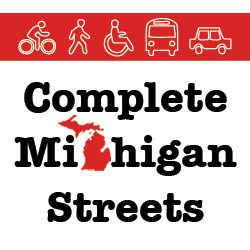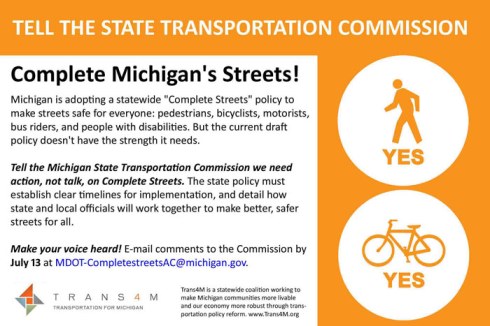You are currently browsing the monthly archive for July 2012.
 Yesterday the State Transportation Commission (STC),a six-member board that establishes policy and plans for Michigan’s transportation department, formally adopted a Complete Streets policy. The policy will direct Michigan Department of Transportation planners to keep all users in mind – including bicyclists, transit riders, motorists and pedestrians of all ages and abilities.
Yesterday the State Transportation Commission (STC),a six-member board that establishes policy and plans for Michigan’s transportation department, formally adopted a Complete Streets policy. The policy will direct Michigan Department of Transportation planners to keep all users in mind – including bicyclists, transit riders, motorists and pedestrians of all ages and abilities.
The STC invited public comment on the draft Complete Streets policy released at its June 28 meeting in Sault Ste. Marie. Many citizens and bicycle and pedestrian advocates across the state took advantage of the public comment period to request that the policy include stronger, clearer and more specific language with firm timelines for implementation. This included a petition drive led by the League of Michigan Bicyclists (LMB), which collected nearly 2500 signatures in a single week.
We thank the STC for being so responsive to the requests made by concerned citizens. Added and/or modified language strengthened the final policy providing more clarity in a number of areas as outlined below. A big thanks also goes out to all of the Michigan Complete Streets advocates who took the time to comment on the draft policy - your voices were heard!
Public Act 135 of 2010 requires the STC to enact a Complete Streets policy by August 2012. The STC has worked closely with the governor-appointed 18-member Complete Streets Advisory Council on the draft policy. The group’s role, according to law, is to advise the STC, county road commissions and municipalities on Complete Streets policies. Council members represent road and transit agencies, state agencies, walking and biking organizations, and environmental, senior citizens and disabled persons groups.
Below is a analysis of the final policy comparing it to the major revisions requested by the LMB petition.
- Strengthen implementation language.
- Identify the procedures or guidelines that will be developed or revised. – Did not include.
- Include a timeframe by which implementing documents will be developed or revised. – Included, by December 31, 2013.
- State a commitment to continue programs to educate and train MDOT personnel and other stakeholders on complete streets implementation. – Included language about training/education.
- Include language about implementation accountability. – Included language with a bit more specificity on what MDOT will report annually to the STC, but nothing about who will be responsible for developing/revising procedures, etc.
- State a commitment to continuing to base facilities design and construction on existing laws, best practices, and guidance documents. – Included language about this.
- Strengthen exception language.
- Refer to the exceptions already outlined in PA 135. – Not specifically referenced.
- Include a timeframe by which an exception procedure document will be developed. – Included, by December 31, 2013
- Include language about developing and using performance measures. – Included language about what MDOT will report annually to the STC, which stated “any information/examples to gauge MDOT’s performance.” (Not exactly what we was requested.)
- Strengthen language to direct MDOT to work with local road agencies (change “may” to “shall”). – Language was strengthened; “MDOT shall work with local road agencies that are undertaking road or bridge projects with federal funds…”
- Amend language about the network approach to expand “non-motorized” users to include all users, including people with disabilities and transit users. – Language states “all users”
- Specify whether there will be a sunset on annual reports to the State Transportation Commission. – Not specified.
Read the final policy below or download a PDF here.
The Complete Streets Advisory Council will meet at 2 p.m., Thursday, July 26, at the Capitol Commons Center, 400 S. Pine St., in Lansing. The meeting is open to the public.
The 18-member council was appointed in accordance with Public Act 135 of 2010. The group’s role, according to law, is to advise the State Transportation Commission, county road commissions and municipalities on Complete Streets policies. The law also requires the State Transportation Commission to enact a Complete Streets policy by August 2012. A “complete street” refers to a roadway that provides appropriate access to all legal users, including motorists, bicyclists, pedestrians and those traveling by assistive devices, such as wheelchairs.
If you need special assistance to attend the July 26 meeting, please contact Debra Alfonso at 517-241-4819. The public also can submit comments in writing prior to the meeting to: Michelle Myers, Michigan Department of Transportation, Intermodal Policy Division, P.O. Box 30050, 425 W. Ottawa St., Lansing, MI 48909. Comments can be e-mailed to the [email protected] address.
Complete Streets Advisory Council members represent road and transit agencies, state agencies, walking and biking organizations, and environmental, senior citizens and disabled persons groups. More information is available online at: www.michigan.gov/completestreets
Michigan’s draft Complete Streets policy is out, and the Michigan State Transportation Commission (MSTC) is looking for your feedback. Through July 13th, we urge you to join other citizens around the state by signing the change.org petition asking MSTC to adopt a stronger policy.
MSTC, a six-member board that establishes the policy and plans for Michigan’s Department of Transportation (MDOT), recently released the draft policy for implementing Complete Streets on state roads. The Complete Streets policy will direct MDOT planners to design and maintain roadways that fit within the context of the community and keep all users in mind, including bicyclists, public transit riders, motorists, and pedestrians of all ages and abilities.
While the state’s effort is a big step in the right direction, bicycle, disability, transit, and pedestrian advocates around the state think the policy could be clearer, more specific, and include firm timelines for implementing Complete Streets procedures. Advocates analyzed the policy, comparing it to national best practices, and have identified a number of key areas where Michigan’s policy could be improved.
The draft policy is the result of Complete Streets legislation passed in 2010 with overwhelming support from Michigan Legislature and the public. The legislation requires that the state adopt a policy by August 2012. MSTC is only allowing two weeks for the public to review and comment on the policy and this period is quickly coming to a close on July 13th. That’s why we need you to ACT TODAY and sign the petition urging MSTC to make improvements to the policy before adopting it.
 Michigan officials need your input on a draft policy that could make streets in your community much safer.
Michigan officials need your input on a draft policy that could make streets in your community much safer.
It’s Michigan’s official Complete Streets policy, and through July 13, you can join other citizens around the state to send a clear message to the state:
Adopt a policy that is strong and that moves Michigan forward.
Last week, the Michigan State Transportation Commission, a six-member board that establishes the policy and plans for Michigan’s transportation department, released a draft policy for implementing Complete Streets on state roads. The Complete Streets policy will direct Michigan Department of Transportation (MDOT) planners to design and maintain roadways that fit within the context of the community and keep all users in mind, including bicyclists, public transit riders, motorists, and pedestrians of all ages and abilities.
While the state’s effort is a step in the right direction, most bicycle, disability, bus, and pedestrian advocates around the state think the policy could be clearer, more specific, and include firm timelines for implementing Complete Streets procedures.
Without clarity and timelines most feel that the policy could become just another document that sits on a shelf in Lansing.
Michiganders have made it clear. They want safe and convenient transportation choices. And they want better, safer, and more Complete Streets.
To make sure Michigan adopts a strong policy, here’s how you can get involved:
Read the 2-page DRAFT Complete Streets policy here.
Please send an email to the Michigan State Transportation Commission and tell them how you feel about roads in your local community.
Here’s the email address: [email protected]
In your note, please tell them that you want a complete streets policy that:
- Establishes clear internal timelines and specific procedures that the Department, must adopt;
- Commit to training Department staff and other stakeholders on Complete Streets implementation, and;
- Directs state officials to use best practices while working with local officials and stakeholders on best practices to make better, safer streets for all.
Spread the word on Facebook:
Please “like” and “share” Trans4M’s Facebook postcard. Include the caption:
Michigan is adopting a Complete Streets policy and we think it can be better. Tell the Michigan State Transportation Commission that we need a stronger Complete Streets policy! http://bit.ly/MU9HJv
Let’s move Michigan forward!
Please “like” and “share”
To learn more about Complete Streets in Michigan, check out the Michigan Complete Streets Coalition website: http://michigancompletestreets.com
Let’s move together to complete Michigan’s streets!















